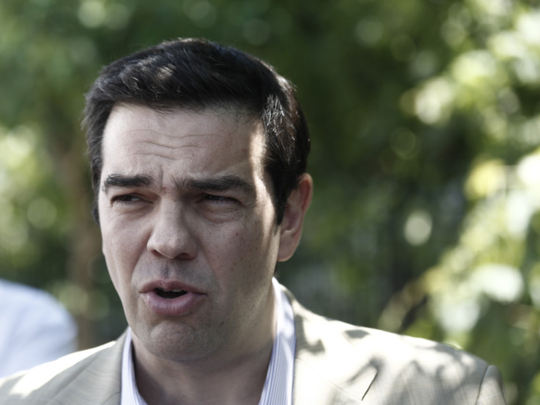
The first thing to understand about the deal forced on Greek Prime Minister Alexis Tsipras last Sunday is that it resolves nothing. The protracted and avoidable crisis that this compact supposedly concludes may even get worse, and at best will drag on for many weeks and months yet. The second thing to understand is that the agreement, and the manner of getting to it, call into question the whole European project.
Far from drawing a line under the past five months of operatic incompetence, the deal announces an extended season of repeat performances. It puts Greece firmly under the thumb of Europe’s finance ministers, obtrusively and indefinitely. The degree of detailed policy direction in the agreement is remarkable. And this is to say nothing of the sequestration of €50 billion (Dh199.32 billion) of national assets, more than a quarter of Greece’s annual gross domestic product, under the European Union’s (EU) supervision.
Why is all that so bad? Ask Europe’s leaders. The first paragraph of the summit declaration says: “The Euro Summit stresses the crucial need to rebuild trust with the Greek authorities as a prerequisite for a possible future agreement on a new European Stability Management (ESM) programme. In this context, the ownership by the Greek authorities is key and successful implementation should follow policy commitments.”
One does not know whether to laugh or cry at the idea that Greece owns this programme. Yet, the statement is right to say that ownership is crucial.
Greek national pride will be bound up with recoiling at these constraints and releasing them. If the Greek parliament, lacking better alternatives, passes the laws demanded of it this week, there’s little reason to suppose that future governments — which will doubtless appear sooner rather than later — will feel bound by them.
To guard against any such disobedience, the bailout funds (most of which, by the way, will flow straight back out to creditors) will be released in stages, with strings attached each time. In other words, successive episodes of backsliding and financial crisis are more or less a deliberate feature of the design.
Europe has already demonstrated that a Greek exit is a possibility — indeed, the preferred option of Germany and its supporters. As a consequence, once the European Central Bank resumes its duties as a lender of last resort, it will be called upon to quell new incipient bank runs. Perhaps, now and then, it will again feel obliged to let them proceed.
Meanwhile, the Greek economy is likely to shrink further. Self-evidently, the deal fails to restore confidence. But if it ever does go into action, its short-term impact will be contractionary. Maybe it can be revised on the run, to moderate the tightened fiscal austerity and provide more support for economic recovery. But to make that point is merely to underline that the quarrels and financial stresses of the past five months will continue.
Greece is a tiny economy. Why does its plight threaten the long-term future of the European project? In itself, it does not. The euro area’s broader recovery may well continue, regardless of Greece’s grim prospects. The harm to the rest of the union is indirect and longer-term.
Exit from the euro system has now been contemplated by Germany and others — and not as a dire possibility, but as a remedy to be deliberately applied. This cannot be unlearned. It remains a tacit threat, intended to keep Greece in line. For a while, to be sure, this could work. And not just on Greece: Pour encourager les autres (encouraging the others), as they say. Nonetheless, the euro system has been redefined as a fixed exchange-rate system, not an indissoluble monetary union. Fixed exchange-rate systems break down. That is what they do.
In addition, the crisis has entrenched a markedly German idea of fiscal propriety. In a monetary union of different nations, with limited labour mobility and a susceptibility to shocks that affect some countries but not others, that is a fatal defect. The recent long recession ought to have made this clear.
The right response was to design mechanisms that deliver automatic stabilising flows across the euro area’s internal borders — a pooled unemployment-insurance scheme, for instance. Whatever your view of fiscal activism, a genuinely system-wide scheme of bank-deposit insurance is needed in its own right. The same goes for collectively guaranteed eurobonds. Germany has just assented to a bailout it opposed. In future, its refusal to mutualise risks in these ways will be even more implacable.
Germany is not straightforwardly nationalist in outlook. It wants further “rule-based integration” in Europe — but it wants the rules to be German, and tightly enforced. Those rules do not allow the kind of fiscal response that the US used to mitigate the recession. And in fixed-exchange-rate systems, fiscal flexibility of that kind is simply indispensable.
Finally, the crisis has demonstrated the EU’s impressive incapacity for government. The sheer dysfunction of recent months has been an education, to me at least. Pathological indecision has been institutionalised. As the deal was announced, Pierre Moscovici, the European Commissioner for economic and financial affairs, said it showed how important it was to increase the EU’s political integration. In a way, of course, he is right — but what sane voter anywhere in the EU will any longer trust this thrashing doom-loop machine with more power?
The EU is stuck in an untenable middle ground. The single currency makes closer political union necessary; the way the system is run makes closer political union impossible. You haven’t heard the last of “exit”.
— Washington Post










